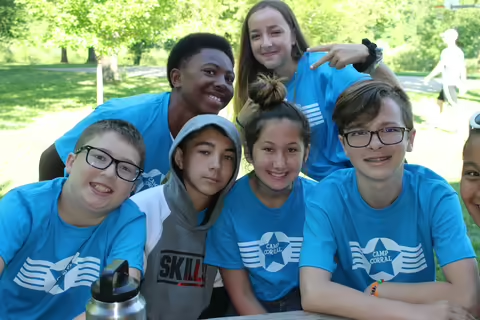MONTICELLO, Ill. – When Brianna Curry showed up at Illinois 4-H Memorial Camp, she found herself surrounded by dozens of other children of veterans. Barely out of middle school, she realized she was in for a unique experience.
"It was just a place where a lot of the kids understood the same things that we had to go through," says Brianna, now an 18-year-old Chicago high school student soon headed for Drake University. "It was really great to be around other kids who understand everything without having to explain in great detail what happened."
April is the Month of the Military Child, a time to recognize the sacrifices given by military and veteran children. These children may be living next door, down the street, or around the corner. About two-thirds of active-duty service members and military families live in civilian neighborhoods, commuting to work, shopping in stores, and attending local schools. In contrast to those living on military installations, these children may have few friends with a parent who has served.
“Some research has found that families in Illinois, especially National Guard families, feel a little bit like their military part is invisible, because it’s hidden in the community and not everybody might understand that about them,” says Leanne Knobloch, University of Illinois communications professor.
Knobloch has interviewed families in transition, including military and veteran families like Brianna’s.
“The kids told us they had a lot of pride in their family’s military service, but also that they really didn’t feel like the people around them in their communities understood it quite as well.”
University of Illinois Extension hosts children of veterans for a week of camp each summer, with support from Camp Corral, a nationwide nonprofit serving the children of wounded, ill, or fallen veterans. In 2010, Golden Corral founder, James Maynard, and his daughter sought ways to provide meaningful support for military families.
In 2011, they held the first Camp Corral in North Carolina. Since then, the organization has served nearly 29,000 children in camps in all 50 states. Illinois Extension’s 4-H Memorial Camp held its first Camp Corral in 2013.
Brianna has lived through her father’s deployment, combat injuries, a joyful reunion, and the lingering shadow of posttraumatic stress disorder, which impacts up to 20% of those who served in Iraq.
“That was a really hard period to go through,” she says. “Even thought I was young, I could still understand the depth of what a war was, and that he could possible not come home. He almost did not come home. The only reason he did come was because of getting shot, and obviously that was terrifying. The one thing you don’t want to get is that knock at the door that your significant person got hurt.”
Extension Educator and Camp Director Andy Davis has seen the positive benefits of having children interact with other children who share the same experiences can have. Since 2005, Davis has managed team-building programs for middle school, high school, university, and professional participants, and says it is an honor for him to serve the military-connected campers he meets.
“A lot of these kids that come from military families tell us, ‘This is my second family,’” Davis says. “They move around so much, but we're always here for them. They come and get to see the same group of friends.”
Brianna returned to camp, now as a counselor. Davis describes her as a “happy, cheerful person” who easily transitioned from camper to counselor. She says her own counselors had an enormous impact on her.
“They were the reasons I wanted to be a counselor, because of the way they were really supportive, and they took so much pressure and stress off me,” she says. "If I can give that same kind of support to another little girl, well, yeah, I want to do that.”
Camp Corral returns this year after the pandemic break, but with a twist. Instead of campers sharing cabins with friends, 32 families will stay in cabins of their own, bonding over traditional camp activities, such as swimming, hiking, boating, and stargazing, all while maintaining their pandemic-induced bubble. Group gatherings will take place within the limits of Illinois Department of Public Health COVID-19 protocols, socially distanced, under a mask mandate, with plenty of hand sanitizer stations.
Brianna asks everyone to recognize that military families can look like any family, that there’s not just one kind of military family, and to recognize the struggles these families may be going through, even though there are fewer serving overseas.
And as for Camp Corral?
“Going to camp just let me be a kid,” she says. “I think that was the purpose of it in the first place.”
SOURCE: Andy Davis, University of Illinois Extension 4-H Camp Director
WRITER: Linda Hughes Kirchubel, University of Illinois Extension Communications Writer
ABOUT EXTENSION: Illinois Extension leads public outreach for University of Illinois by translating research into action plans that allow Illinois families, businesses, and community leaders to solve problems, make informed decisions, and adapt to changes and opportunities.
